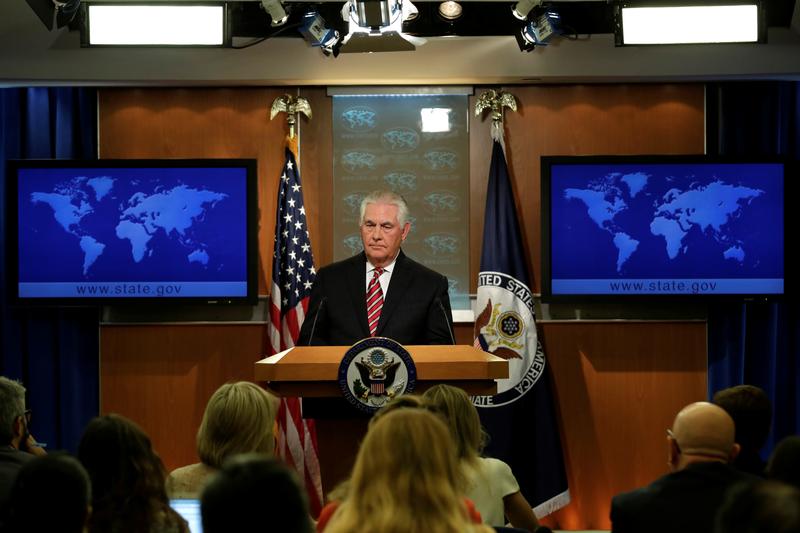WASHINGTON — The United States is taking steps and considering a range of further actions over Burma’s treatment of its Rohingya Muslim minority, including targeted sanctions under its Global Magnitsky law, the State Department said on Monday.
“We express our gravest concern with recent events in Myanmar’s Rakhine [Arakan] State and the violent, traumatic abuses Rohingya and other communities have endured,” it said in a statement.
It added: “It is imperative that any individuals or entities responsible for atrocities, including non-state actors and vigilantes, be held accountable.”
Rohingya Muslims have fled Burma in large numbers since late August when Rohingya insurgent attacks sparked a ferocious military response, with the fleeing people accusing security forces of arson, killings and rape.
Secretary of State Rex Tillerson said on Wednesday the United States held Burma’s military leadership responsible for its crackdown on the Rohingya Muslim minority.
Tillerson stopped short of saying whether the United States would take any action against Burma’s military leaders over an offensive that has driven more than 600,000 Rohingya Muslims out of the country, mostly to neighboring Bangladesh.
The State Department made the announcement ahead of US President Donald Trump’s maiden visit to the region early next month when he will attend a summit of ASEAN countries, including Burma, in Manila.
It marked the strongest US response so far to the months-long Rohingya crisis but came short of applying the most drastic tools at Washington’s disposal such as re-imposing broader economic sanctions suspended under the Obama administration.
Critics have accused the Trump administration of acting too slowly and timidly in response to the Rohingya crisis.
The State Department said on Monday: “We are exploring accountability mechanisms available under US law, including Global Magnitsky targeted sanctions.”
Measures already taken include ending travel waivers for current and former members of the military in Burma, and barring units and officers in northern Arakan State from US assistance, it said.
“We have rescinded invitations for senior Burmese security forces to attend US-sponsored events; we are working with international partners to urge that Burma enables unhindered access to relevant areas for the United Nations Fact-Finding Mission, international humanitarian organizations, and media,” the statement said.
In addition, Washington is “consulting with allies and partners on accountability options at the UN, the UN Human Rights Council, and other appropriate venues,” it said.
Interviews with more than a dozen diplomats and government officials based in Washington, Burma’s capital Naypyidaw, Rangoon, and Europe have revealed that punitive measures aimed specifically at top generals were among a range of options being discussed in response to the Rohingya crisis.
Such measures could include the possibility of imposing asset freezes and prohibiting American citizens from doing business with them.
[related]
Washington has worked hard to establish close ties with Burma’s civilian-led government led by Nobel laureate and former dissident Aung San Suu Kyi in the face of competition from strategic rival China.
Forty-three US lawmakers urged the Trump administration to re-impose US travel bans on Burma’s military leaders and prepare targeted sanctions against those responsible for the crackdown.
The Magnitsky Act, originally passed in 2012, imposed visa bans and asset freezes on Russian officials linked to the 2009 death in prison of Sergei Magnitsky, a 37-year-old Russian whistleblower. It has since been expanded to become the Global Magnitsky Act, which could be used against the generals in Burma.



